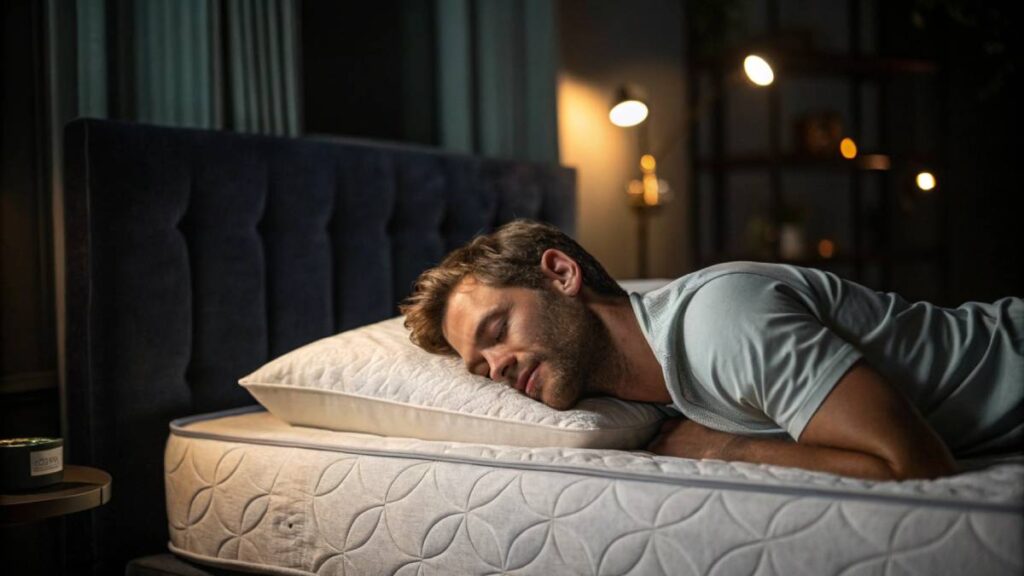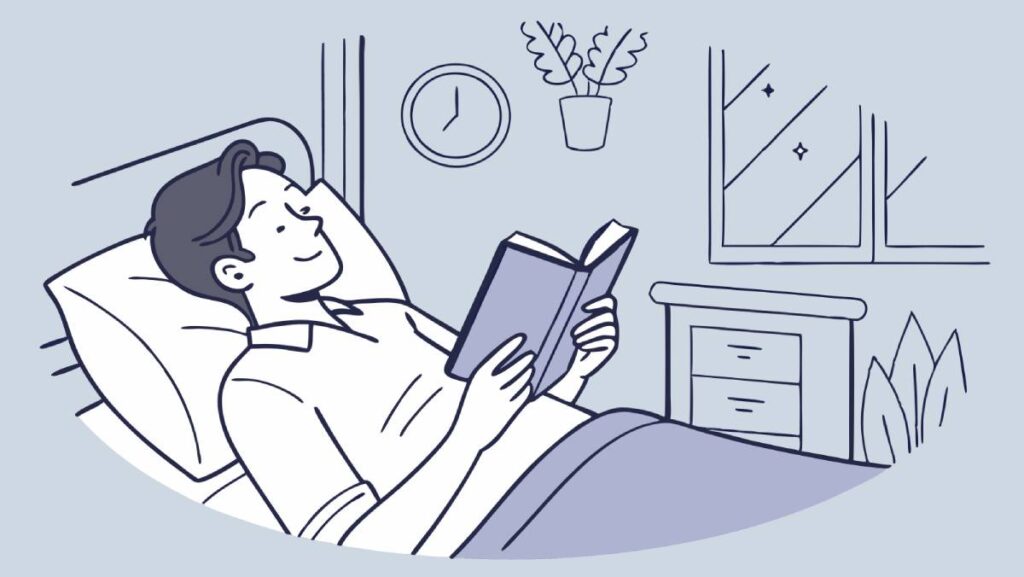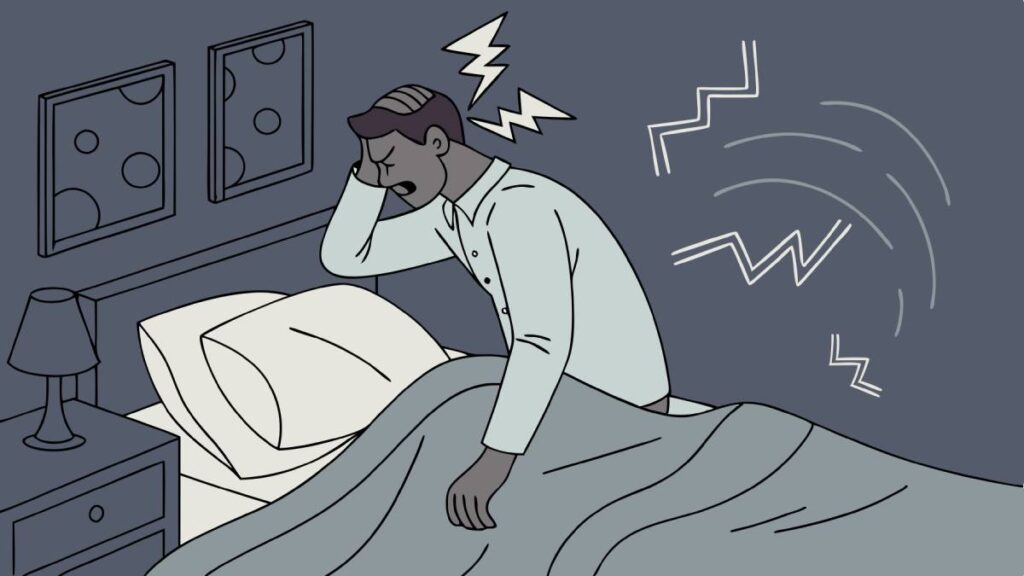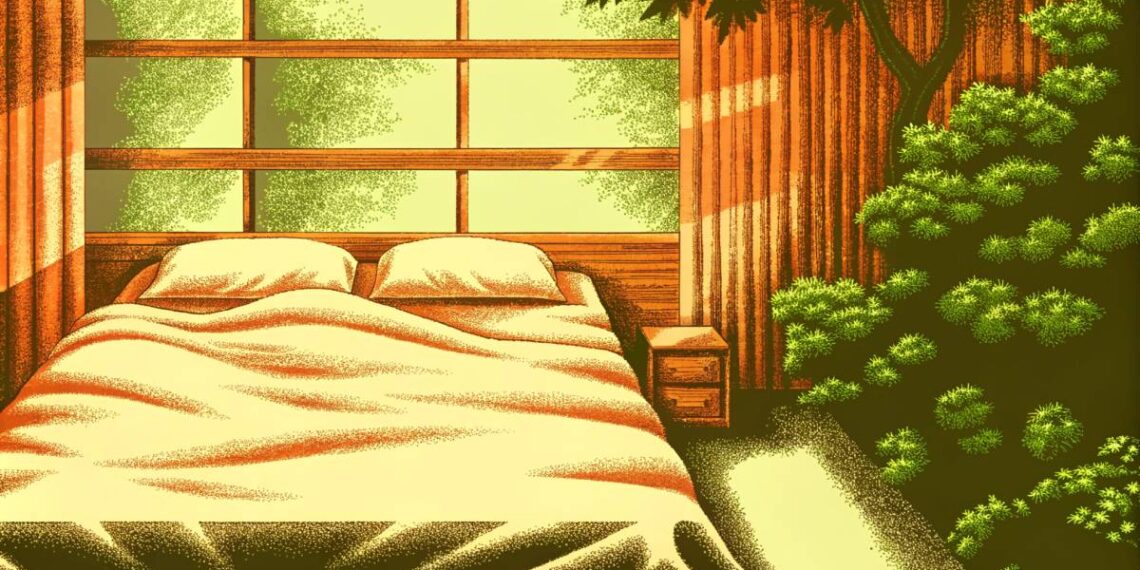Sleep is often the unsung hero of good health—especially for men, whose overall well-being and daily performance depend heavily on quality rest. Yet, so many men overlook the profound impact of a good night’s sleep. Whether you’re powering through a busy workweek or dealing with the demands of family life, sleep plays a vital role in restoring your body and mind. From muscle recovery to cognitive function, the benefits of proper sleep are endless, and the absence of it can lead to serious health issues. In this guide, we’ll explore simple but effective strategies to improve sleep health, helping men everywhere wake up feeling their best and ready to conquer the day.
Key Takeaways
- Quality Sleep Matters: Adequate sleep improves physical health, brain function, and emotional well-being.
- Impact of Poor Sleep: Chronic sleep deprivation is linked to heart disease, weight gain, cognitive decline, and hormonal imbalances.
- Unique Men’s Sleep Patterns: Men often experience deeper sleep stages but face common disruptions like insomnia, sleep apnea, and stress.
- Lifestyle Factors: Diet, exercise, and stress management all play critical roles in achieving better sleep.
- Sleep Environment: Optimizing lighting, noise, temperature, and bedding can drastically improve sleep quality.
- Healthy Sleep Habits: A consistent sleep schedule and a relaxing pre-bed routine are key to better rest.
- Professional Help: For persistent sleep issues, seeking medical advice and considering sleep studies can offer valuable insights.
Men’s Sleep Health: A Vital Part of Living Well
Importance of Quality Sleep
Catching quality Z’s is a must-have for anyone, but it’s super important for guys. While you’re snoozing, your body is doing some heavy lifting—fixing up your muscles, recharging your brain, and making sure all systems are a go. Sleep helps you keep that energy up, stay sharp, and feel good, setting you up for a way better day.
| Sleep Quality Factor | How It Boosts Health |
|---|---|
| Sleep Duration | Getting a good 7-9 hours drops the chances of chronic disease. |
| Sleep Depth | Deep snooze time is golden for healing and brainpower. |
| Sleep Consistency | Sticking to a routine keeps the mind in check and emotions stable. |
Grasping how awesome sleep is can get guys of all ages thinking more about looking after themselves—whether they’re hustling hard at work or enjoying the golden years.

Impact of Poor Sleep on Men’s Health
Sadly, a lot of men hit roadblocks when it comes to sleep, leading to all sorts of problems. Skimping on rest doesn’t just crank up stress; it scrambles your decision-making, leaves you moody, and even messes with your health, raising the stakes for heart issues, diabetes, and packing on extra pounds.
| Health Issue | How Bad Sleep Takes a Toll |
|---|---|
| Heart Disease | Cranks up stress hormones, messing with your ticker. |
| Weight Gain | Throws appetite hormones out of whack, leading to overeating. |
| Hormonal Imbalance | Takes a dive on testosterone, hitting libido and muscle size. |
| Cognitive Decline | Scrambles memory and learning, biting into work life. |
Guys stuck in a sleep rut should make it a top-of-the-list priority to tackle these sleep hiccups and boost how they feel day-to-day. For a deeper dive into how sleep affects the young ones, check out our piece on teenage sleep deprivation or score some golden advice for those rocking their 30s in sleep tips for 30s.
“Sleep is the golden chain that ties health and our bodies together.” – Thomas Dekker
Understanding Men’s Sleep Patterns
Differences in Sleep Needs Between Men and Women
Men and women have unique snooze strategies. Both clock in around 7 to 8 hours each night; however, guys often face curveballs impacting their beauty sleep. Cracking this code can boost men’s rest like never before.
Here’s a cheat sheet comparing sleep durations for different age squads:
| Age Group | Recommended Sleep Duration (Men) | Recommended Sleep Duration (Women) |
|---|---|---|
| Young Adults (18-25) | 7-9 hours | 7-9 hours |
| Adults (26-64) | 7-8 hours | 7-9 hours |
| Seniors (65+) | 7-8 hours | 7-8 hours |
Fellas might hit deeper dreamland stages, making for rockstar-like rejuvenation. But watch out! Things like stress, day-to-day choices, and health troubles can seriously rattle their shut-eye.
Common Sleep Disorders in Men
Dudes often wrestle with a lineup of sleep foes threatening their wellness dreams. Top contenders include:
- Insomnia: Trouble clocking out or staying asleep, thanks to stress and worry. Research has found men are more prone to insomnia linked to work and personal stressors.
- Sleep Apnea: Breathless bouts during dreamland haunt several men, especially those with extra baggage. Without proper action, it can rocket into major health drama. For more on this, hop over to our piece on senior sleep apnea.
- Restless Leg Syndrome (RLS): Blokes might tangle with RLS more than ladies. Annoying leg sensations nagging to be moved can bring chaos to sleep patterns.
- Narcolepsy: While not the usual suspect, narcolepsy isn’t alien to men and throws in wild sleep blitzes and daytime nod-offs.

Grasping these sleep gremlins is your ticket to sweeter dreams and better health for guys everywhere. If these woes linger, a holler to a health guru might just serve up the right sleep recipe. For extra snooze savers, discover our tips on improving sleep naturally.
Lifestyle Factors Affecting Men’s Sleep
Men’s sleep habits can take quite a hit based on their daily choices. Figuring out the roles stress, diet, and exercise play in this can really up the game when it comes to feeling well-rested and ready to tackle the day.
Stress and Sleep
Stress is like that uninvited guest who just won’t leave and keeps messing up your night’s rest. When stress hits the roof, the body kicks out hormones like cortisol – the arch-nemesis of a good night’s sleep. This leaves the mind wound up, leading to sleepless nights or tossing and turning.
Here’s how stress levels rock men’s sleep:
| Stress Level | Percentage of Men Wrestling with Sleep |
|---|---|
| Low | 20% |
| Moderate | 40% |
| High | 70% |
Chilling out through methods like mindfulness and meditation can work wonders. Kiss those restless nights goodbye by checking our guide on improving sleep naturally for more tips.

Diet and Sleep
Your plate could be your ticket to dreamland or a one-way pass to staring at the ceiling. Caffeine-laden drinks can be party crashers if downed too late, and those late-night feasts can leave you tossing in discomfort.
Here’s how food choices stack up sleep-wise:
| Food Type | What It Does to Your Zzz’s |
|---|---|
| Caffeine | Keeps eyes wide open |
| Heavy Meals | Brings on the tummy troubles |
| Light Snacks | Helps invite the drowsiness |
Pick snacks like almonds or turkey for a smoother transition to sleepy town. For insights on handling sleep across different ages, check our guides on teenage sleep deprivation and sleep tips for the 30s.
Physical Activity and Sleep
Working out isn’t just for looking good; it’s a ticket to better snooze. Exercise fights off those mucky feelings like anxiety and encourages deeper sleep. But planning is key; sweat it out too close to bedtime, and it might backfire.
Check out how often exercise and sleep quality match up:
| Workout Frequency | Folks Reporting Sweet Dreams |
|---|---|
| Rarely | 30% |
| 1-2 Times a Week | 50% |
| 3 or More Times a Week | 70% |
Getting into a regular workout rhythm can change your sleep game. If sleep’s still a riddle, take a look at our article on senior sleep apnea for more ideas.
By getting savvy on how stress, eating habits, and exercise shape men’s sleep quality, there’s a clear path to better rest.
Sleep Environment Optimization
Crafting a cozy spot for a snooze is key to boosting how well guys hit the hay. Pay attention to the whole room vibes and your bedding.

Creating an Ideal Sleep Environment
Setting up your bedroom right makes all the difference. Here’s what to look out for:
- Lighting: Keep lights low in the evening—it helps tell your body that it’s shut-eye time. Steer clear of bright bulbs after sundown to keep your sleep on track.
- Noise Control: Silence is golden. But if quiet’s not happening, grab some earplugs or fire up a white noise machine to block the racket. Peek at our post on screen time and sleep for more tips.
- Temperature: Keep it cool—between 60°F and 67°F is perfect for catching Zs. Adjust the thermostat to make your bedroom snug and help you drift into dreamland.
- Clutter: A clean room equals a calm vibe. Tidy up to keep your mind at ease and distractions away.
| Element | Ideal Condition |
|---|---|
| Lighting | Dim lights in the evening |
| Noise | Quiet or white noise |
| Temperature | 60°F – 67°F |
| Clutter | Clutter-free space |
Importance of Comfortable Bedding
Good bedding is like a bedtime hug. Here’s what you need to know:
- Mattress Quality: The right mattress makes all the difference. Pick one that feels good to you and supports your body well. A solid mattress can level up your sleep and ease aches. Our article on best mattresses for seniors has more insights.
- Pillow Choice: A pillow that gets along with your noggin and neck is a must for keeping your spine happy. Whatever material you prefer—be it memory foam, feathers, or latex—make sure it suits how you sleep.
- Bedding Fabric: Opt for soft, airy stuff like cotton or bamboo to stay comfy. Stay away from fabrics that heat up or irritate.
| Bedding Element | Recommended Feature |
|---|---|
| Mattress | Supportive, comfort-based on preference |
| Pillow | Supports neck & head; aligns with sleep position |
| Fabric | Soft, breathable materials |
Getting your sleep setup right and snuggling up in comfy bedding are big steps for better sleep health for men. Making these tweaks can lead to more restful nights and a happier you, no matter your age.
Establishing Healthy Sleep Habits
Nailing down a good night’s sleep isn’t just about counting sheep. For the fellas out there, setting up some solid sleep habits can really amp up your snooze game and overall well-being.

Consistent Sleep Schedule
Want better sleep? Start by hitting the hay and rising and shining at the same time every single day, even on those beloved weekends. Your internal clock will thank you by making it easier to drift off and pop awake naturally—no more soul-sucking alarms!
Take a gander at how much shut-eye folks should be tucking into by age group:
| Age Group | Zzz Hours Needed |
|---|---|
| Newborns | 14 – 17 hours |
| Toddlers | 11 – 14 hours |
| Preschoolers | 10 – 13 hours |
| School-age Kids | 9 – 11 hours |
| Teenagers | 8 – 10 hours |
| Young Adults | 7 – 9 hours |
| Middle-aged Squad | 7 – 8 hours |
| Golden Oldies | 7 – 8 hours |
Craving more tips on sleep through life? Check out newborn sleep patterns and teenage sleep deprivation.
Wind-Down Routine Before Bed
A little “me time” before sleep can do wonders. Think of it as a cue to your body that it’s time to chill. Whether it’s flipping through a book, mastering slow breathing, or soaking in a warm bath, these quiet activities can help untangle your mind, ditch stress, and get your body ready to snooze.
Try to hit repeat on this chill-out session every night around 30 to 60 minutes before bed. Here’s some inspiration:
- Dive into a good page-turner or listen to a story
- Breathe in, and breathe out with some deep breathing exercises
- Stretch out with gentle yoga moves
- Let calming tunes or nature sounds wash over you
Peek at additional ideas in our Improve Sleep Naturally article.
Limiting Screen Time Before Sleep
Put down the phone! Cutting back on screen time right before bed can seriously boost your sleep quality. That pesky blue light from phones and laptops messes with melatonin, the magic sleep hormone, making it tougher to doze off.
Experts say to ditch the screens at least an hour before bed. Instead, engage in some non-digital activities like:
- Scribbling thoughts in a journal
- Getting crafty or artsy
- Sharing laughs and stories with family or pals
- Doing relaxation exercises to unwind
Curious about the effects of screen glare on your slumber? Check out screen time and sleep.
By rocking a regular sleep routine, winding down mindfully, and cutting screen time, you’ll transform your bedtime and wake up feeling refreshed and ready to tackle the day!
Coping with Sleep Challenges
For guys aiming for top-notch snooze time, tackling sleep hiccups like insomnia, sleep apnea, and restless leg syndrome is key. Getting a grip on these hurdles will lay the groundwork for more z’s and less tossing and turning.
“Good sleep is essential to live a long, healthy life, and understanding your body’s sleep needs is key to unlocking better health.” – Dr. Michael Breus, Clinical Psychologist
Addressing Insomnia
Insomnia is a sneaky rascal that messes with a lot of men at different life stages. It’s like a bad friend who doesn’t let you fall asleep, wakes you up at ungodly hours, or keeps you staring at the ceiling all night. Often, this pest is invited by stress, worries, or life changes.
| Factors | What’s Going On? |
|---|---|
| Stress | Stress can be like a loud roommate, making it hard to catch shut-eye. Chill techniques can quiet down the noise. |
| Health Conditions | Conditions like depression or chronic pain are sleep thieves. They chip away at peaceful nights. |
| Medications | Some drugs have side effects that mess with sleep cycles. A chat with a doctor can shed light on this. |
To kick insomnia to the curb, sticking to a sleep schedule and creating a cozy, quiet lair can help. Mindfulness and deep breathing before hitting the sack are like putting up a “do not disturb” sign for your brain. For more scoops, see our article on improving sleep naturally.
Dealing with Sleep Apnea
Sleep apnea is no joke—it’s when you stop catching those breaths in your sleep, causing groggy days and potential health potholes.
| Type of Sleep Apnea | What Happens? |
|---|---|
| Obstructive Sleep Apnea | Your airway decides to have a party, and throat tissue crashes it, blocking breathing. |
| Central Sleep Apnea | The brain’s off-duty, not sending the “breathe” memo to muscles—often seen with other health issues. |
Men, especially those carrying extra pounds or with a family track record, are in the sleep apnea danger zone. If you’re a loud snorer or wake up gasping, it’s time to get checked out. Possible fixes include lifestyle tweaks, CPAP machines, or retainers that double as sleep saviors. Take a detour to our piece on senior sleep apnea for more details.
Managing Restless Leg Syndrome
Restless leg syndrome (RLS) brings an itch that can’t be scratched, leading to the midnight fidgets. This can tank your sleep score quickly.
| Symptom | What’s It Like? |
|---|---|
| Uncomfortable Sensations | Feels like your legs are on a weird dance—crawling, pulling, tugging—especially when you’re trying to relax. |
| Nighttime Worsening | In the evening, things ramp up, making sleep a real chore. |
Guys battling RLS might find relief in gentle stretching or a nice leg rub before dreaming time. Less caffeine and sticking to sleep routines help too. For more tricks, check out our articles on screen time and sleep and teenage sleep deprivation.
Gettin’ Some Professional Backup
Dealing with sleep issues ain’t something to ignore, especially for the fellas out there. When doing it all by yourself just ain’t cutting it, getting an expert in your corner might just be what the doctor ordered.
Why Bother Seeing the Doc?
Guys who can’t seem to shake off stubborn sleep woes should definitely holler at a healthcare pro. Those nights staring at the ceiling or feeling like a zombie during the day might not be as harmless as you think. Could be there’s something more going on, like a hidden health hiccup needing some love and attention. A doc’ll check you out and figure out if it’s got anything to do with your daily habits, body blues, or mind muddles.
Professional advice means putting together game plans customized to your situation. Chatting with a pro could lead to tips on changing your behavior, tweaking your lifestyle or maybe even trying some meds. Kicking off a convo about sleep ensures you’re getting the right advice and care, which means feeling better all around.
What’s the Deal With Sleep Studies?
Sometimes, the pro might send you off for a sleep study, pol… something hard to pronounce. It’s like a magnifying glass for sleep patterns and sleep fussiness. Why bother with one of these, you ask? Here’s why:
| Docs can peek in on heartbeats, breathing, and oxygen levels as you catch some Z’s, giving the full lowdown on your sleep status. | What’s It All About? |
|---|---|
| Spot-On Diagnosis | These studies dig into your sleep cycles and hiccups, nailing down exactly what’s going wrong, whether it’s sleep apnea, restless legs, or something else. |
| Watching Sleep Stuff | Docs can peek in on heart beats, breathing, and oxygen levels as you catch some Z’s, giving the full lowdown on your sleep status. |
| Personalized Game Plan | What they learn can guide real-deal treatment options so fellas get just the right fix for their unique sleep saga. |
| Better Living | Getting the right diagnosis and fix leads to way better days and nights, upping energy, and sharpening that noggin. |
Getting the hang of men’s sleep routines with some pro help and sleep studies paves the way for healthier shut-eye habits and a more awesome life overall. Hungry for more ways to drift off naturally? Check out our tips for improving sleep naturally.
Supporting Men’s Sleep Health
Helping guys catch some solid Z’s isn’t something they should tackle alone. Their better half or buddies can be true champs, cheering them on towards better snooze habits and crafting a chill vibe for epic, snore-free slumber.
How Partners Can Help You Sleep Like a Baby
You know, who you’re sleeping next to can make a big difference. The duo can cook up a pre-bed routine that screams, “Time to hit the hay!” Things like dimming the lights to nearly put you in “cave mode,” chatting about the weirdest things you’ve seen on TV, or diving into a book together can really set the stage for some serious shut-eye.
Also, tag-teaming any sleep challenges is a game-changer. If one is facing restlessness or gets mistaken for a chainsaw at night, the other can swoop in with life hacks, healthy habit suggestions, or chill-out techniques. It’s key for them to be in this together, backing each other like a loyal sidekick in a comic book.
| Ways Your Partner Helps | How It Makes Sleep Better |
|---|---|
| Kickstarting a bedtime ritual | Lowers the curtain for sleep-time |
| Turning down the noise | Keeps the sleepy vibes uninterrupted |
| Boosting healthy lifestyle choices | Good for the whole you and sleep quality |
| Talking about sleep stuff | Builds teamwork and understanding |
Getting into the Habit of Chatting About Sleep
Chatting about your dreams or tossing and turning is a winner for healthy sleep vibes. Couples should feel A-Okay mentioning what makes them snooze like a log or stare at the ceiling all night. This back-and-forth can help spotlight issues and cook up a fix together.
Imagine, one of you is losing out on sleep ’cause of stress or something serious like the big loud snore monster. Opening up about it can get you support or some wise words from a pro. Talking sleep stuff can draw you closer, making sure you’re both on the same sleep wave.
Having these chats often reveals how skipping that fourth coffee or binging on sweet treats can switch up your sleep groove. Couples who tackle sleep woes together stand to gain not just better nights but also stronger bonds and richer lives.
Share more, sleep better:
- Pencil in time to chat about sleep
- Share thoughts and worries with kindness
- Do regular check-ins to see how sleep’s treating you
Having each other’s back on the sleep front can turn “toss and turn” nights into “wow, that was refreshing” ones—boosting happiness and amping up your relationship game.
Conclusion
Improving sleep health isn’t just about logging hours in bed—it’s about quality. Men can take control of their rest by making mindful choices regarding their lifestyle, sleep environment, and daily habits. By understanding the unique challenges men face in getting quality sleep, such as stress, sleep disorders, and lifestyle factors, and applying simple strategies, it’s possible to create a healthier, more rejuvenating sleep routine. Whether you’re adjusting your sleep environment or seeking professional help for chronic issues, better sleep leads to better health. Don’t wait until sleep troubles take a toll—start prioritizing your sleep today for a healthier tomorrow.
FAQs
How many hours of sleep do men need?
Men typically need 7-9 hours of sleep each night, though this varies based on age and individual health.
What are common sleep disorders men face?
Common sleep disorders include insomnia, sleep apnea, restless leg syndrome, and narcolepsy, all of which can significantly impact sleep quality.
How does stress affect men’s sleep?
High levels of stress increase cortisol, which disrupts the body’s ability to relax, making it difficult to fall asleep and stay asleep.
Can exercise improve sleep quality for men?
Yes, regular physical activity promotes deeper, more restorative sleep, but it’s important to avoid strenuous exercise too close to bedtime.
What is the ideal sleep environment for men?
An optimal sleep environment includes a cool, quiet, dark room with a comfortable mattress and pillow to support restful sleep.








